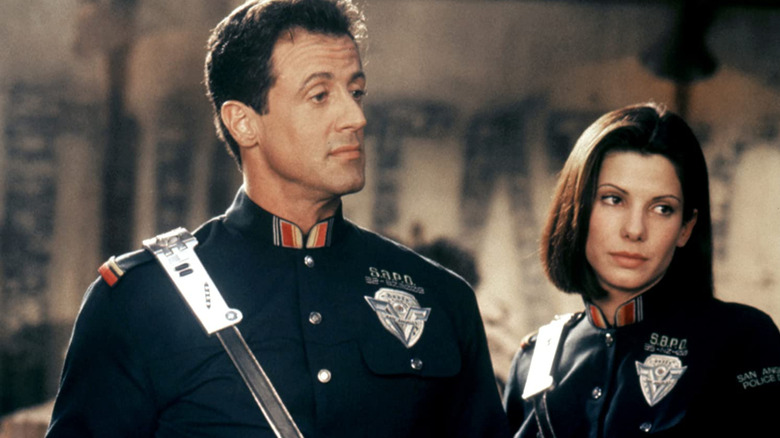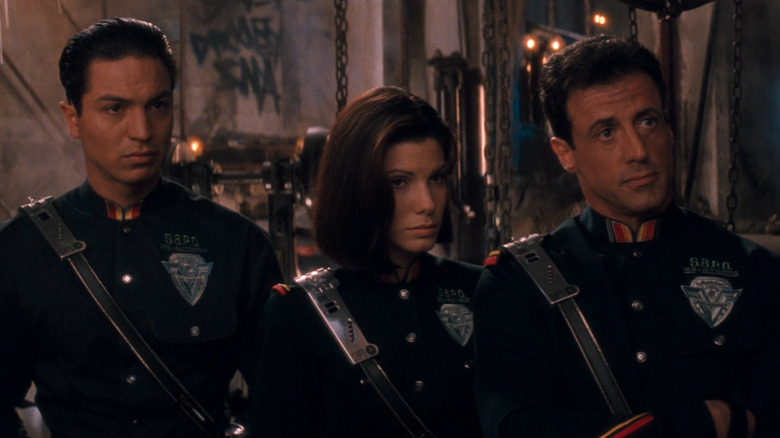Sylvester Stallone Put A Nervous Sandra Bullock At Ease On The Set Of Demolition Man
Marco Brabilla's 1993 film "Demolition Man" was amusing when it was first released, but has become whimsically prescient as time has passed. Set largely in 2032, "Demolition Man" is a utopian film about how humanity has learned to be peaceful and to get along. They achieved this through an extreme right-wing televangelist messiah figure named Dr. Cocteau. People no longer touch physically, cussing is met by strict fines, and the only business to have survived the bloody Franchise Wars was Taco Bell, the fanciest restaurant in town. Anything that's bad for you is outlawed, including the consumption of salt. Most amusingly, toilet paper has been replaced by a technology that Sgt. John "The Demolition Man" Spartan (Sylvester Stallone) describes as "three seashells."
Audiences will get no points for guessing that this so-called utopia actually houses secrets, that poverty and oppression still exist, and that its bland sexlessness is actually a proper dystopia. There may not be violent crime, but at what cost? Spartan, having been cryogenically frozen in 1996, arrives in the future to shake up the system and to apprehend a vicious criminal named Simon Phoenix (Wesley Snipes), also frozen in 1996.
Sgt. Spartan's emissary to the world of 2032 is Lenina Huxley, played by Sandra Bullock, one year prior to her blockbuster breakout performance in "Speed." When Bullock was on the rise, she took her craft very seriously, preferring to affect a Method approach, staying in character as much as possible on set. According to a 1993 article in the Los Angeles Times, Bullock was nervous to appear in a production on the scale of "Demolition Man."
Luckily, Stallone's versatile nostrils kept her at ease.
The Meisner school
As the Times reported, Bullock had spent her early years as an actress studying under celebrated acting coach Sanford Meisner, founder of the Meisner technique. The Meisner technique, for those unfamiliar with the fineries of individual acting schools, was extrapolated from Konstantin Stanislavsky's Method, and was meant to be directed outward at the other players in a scene. It was meant to achieve a certain kind of dramatic authenticity as a group, rather than delve deeply into one's own character exclusively. This was the kind of acting Bullock was devoted to, and she was very sensitive to co-stars' needs as a result. She said of her training:
"Sandy taught me to have real respect for the other actor. [...] It's not good to make their eyes water when you're doing a love scene. They kept a case of Binaca on the set of 'Demolition Man' at all times, and a lot more people got killed than kissed on that picture."
Indeed, Bullock's character and Stallone's character do have a love scene in "Demolition Man," but, because of the fineries of a sterile, touch-free future, sex is achieved through a pair of head-mounted, V.R. devices. Sex is touch-free. Acting opposite a star of Stallone's stature was intimidating enough, but having to enact a virtual sex scene was especially nerve-wracking for Bullock. Bullock, according to the Times article, had replaced actress Lori Petty at the last minute. Petty, more comfortable with comedy, was already well-suited to the role of Huxley, so Bullock was doubly overwhelmed.
Stallone's nose
The pressure was let off immediately, however, as Stallone proved himself to be something of a goofball right away. "I was a little scared," she admitted. But Stallone shoved something in his nose, and everything was okay. "When I went in the first day and met Sly," Bullock said, "and he had golf tees up his nose."
While Stallone may not have been a student of the Meisner technique, he clearly had enough wherewithal to keep the tone on set light, and to retain his sense of humor. Golf tees up his nose, and Bullock is at ease.
Indeed, the spirit of prankstership likely informed "Demolition Man" as a whole. It may have an essayic undercurrent of conservatism run amok, and the dangers of a right wing-extrapolated utopia (it came out during the Clinton administration, but the fears lingered). Overall, however, Brambilla's film is a comedy first. The action is great, and the sci-fi intriguing, but the culture clash is where its heart lies. Stallone capably plays a brusque buffoon who has to get used to a world where he wasn't welcome. In one of the film's funnier scenes, Sgt. Spartan, needing toilet paper, walks up to a wall-mounted misdemeanor dispenser and calmly speaks multiple cuss words at it. Spartan gets a ticket for each word, gathers a pile of tickets in his hand, and announces that he now has the paper he needs. Those lighter, impish moments are what give "Demolition Man" many of its more appealing qualities.
The lesson is clear. If you want to keep co-stars at ease, shove golf tees up your nose.


